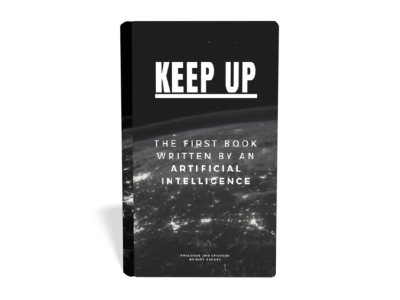GPT-3 is the most advanced autoregressive language model in the world. To keep it simple, that means it’s very, very good at predicting the next word in a sentence.
However, in the process of predicting words, the sophisticated technology that underlies the model also allows it to engage in surprisingly emergent behavior.
For example, take a look at this paragraph:
Living a Meaningful Life, Keep Up
This was entirely written by GPT-3 on the subject of the meaning of life. There’s no editing or trickery here — it is the raw output of the model after being primed on a similar subject.
The text generation doesn’t stop there, by the way. There’s an entire chapter with similarly lucid and interesting thoughts, and that chapter is just one of eleven chapters in a new, 68-page book written entirely by AI.

Keep Up is as fascinating as it is provocative. The book was written in not days, weeks, or months, but hours. It features surprisingly cogent predictions of the future, and provides suggestions on things we can do to improve human outcomes. It also discusses some of the darker aspects of human society — suicide, murder, and more.
Considering that the capacity for complex language is one of the main differentiators between man and animal, and is also one of the key ways that we define the members of our species as, you know, our species — what will happen when sufficiently advanced language models are developed that can write, speak, and think better than we can?
What will schoolteachers do? Authors? Salespeople? How will the landscape of dating apps, education, and policy change when artificial intelligences are better at engaging with human beings than human beings are?
Many will draw simple parallels to the industrial and agricultural revolutions, saying that ‘it’s true that old jobs will be discarded, but new, better jobs that depend on new technology will be created’, and I think that’s true to a point.
But if Keep Up is anything to go by, AI is fast approaching our own capacity of human effectiveness. Many sections of that book were better than most works I could produce in days, and it likely took the algorithm just a few minutes.
When it breaches the human threshold, it will literally be better than us at every economically valuable task, from reading, to writing, to strategizing, to selling — and it makes one wonder whether we’ll soon be needed for anything.
It’s a scary proposition, and one that (unfortunately) we don’t yet have the answer for. Perhaps we should ask GPT-3, and see what it comes up with.






